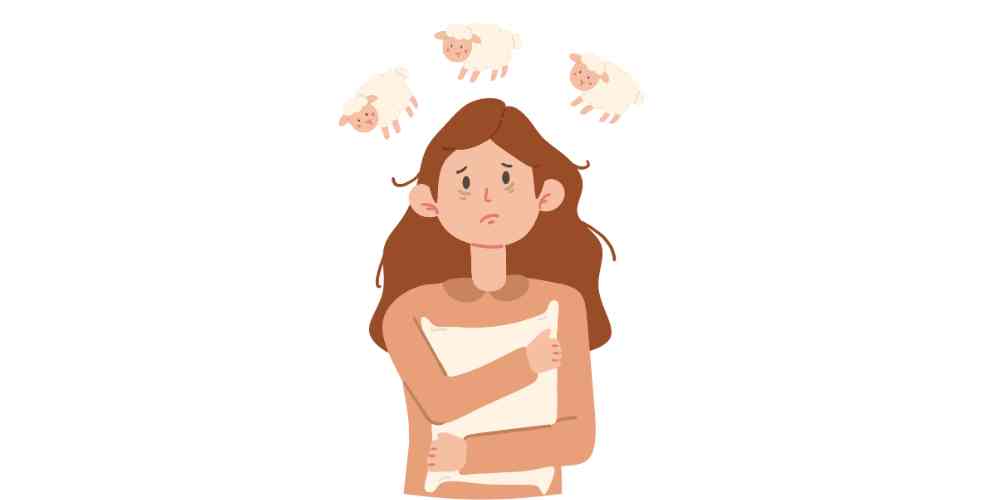ADHD and sleep are two words that just don’t go that well together. Why is it, that the ADHD brain, seems to go into overdrive when everyone else seems to sleep? And, with sleep being essential for many aspects of health and well-being, where does it leave those with ADHD, when they’re wide awake at 1 am?

Sleep problems and ADHD
Anyone who lives with someone with ADHD would know just how sleep, or lack of, affects them and everyone around them. While more and more people these days are having issues with sleep, for someone with ADHD, sleep can be the stuff of living nightmares.
Sleep to me, is like an expletive. It’s a dirty word that causes offence. The problem is, the more you fight it, the worse it gets. But it also doesn’t seem to get any better if you overly befriend it! Working ‘with it‘ however, could have its benefits.
The brain that never shuts off
It seems to be well known, that those with ADHD, struggle to unwind and ultimately achieve quality sleep at night. Although there are some studies on adult ADHD and sleep, unfortunately, most of these require payment for access.
One small pilot study however, measured the effects of an adjusted form of Cognitive Behavioural Therapy (CBT). It holds some promise that it may help those adults with ADHD and co-existing insomnia get better sleep, through different techniques.
From what I’ve learned from 1st hand experience, the ADHD brain has trouble slowing down and turning off, particularly at night.

What is interesting, is that between the hours of 10 pm and 2 am, I do my best thinking. It’s when my brain is more creative, and my ability to connect ideas and form solutions, springs to life.
As I have said over the years, there just seems to be no ‘off’ switch causing the brain to operate at a million miles an hour, making falling asleep extremely difficult.
Now, this is great if you’re a computer or an ‘open all hours 7 Eleven’, but it’s not so much, if you’re a human. Unfortunately, the 9 to 5 working day ‘norm’ just doesn’t cater for sleep disrupted folk like myself.
Circadian rhythm
The circadian rhythm is our body’s very own clock. It helps regulate our body and brain in relation to day and night. Check out the clip below for a quick and quirky explanation.
the brain awakens
For some reason, as soon as it’s time to go to sleep, the ADHD brain comes alive. Now, I am talking about my own experiences here, but I’m sure there are others out there too, experiencing the same thing.
It’s almost as if, as soon as the sun goes down, the brain flips a switch and starts solving problems or thinking about random crap of no importance.
Either way, it’s not helpful unless the rest of YOUR world revolves around YOUR sleep habits or you are in a position to work with it, but on your terms.
Sensory Issues and Sleep
Other things can delay falling asleep such as sensory issues. Those lumps and bumps in the bed or clothing, tags, hair getting caught up, itchy eyes, pillow too prickly, and the bed covers – JUST. BEING. WRONG. can all contribute to the delayed onset of sleep.
I constantly move to get comfortable, and often feel like one of those dogs you see in a movie, going around and around and around in circles, to find the right spot. The funny thing is, this then makes me laugh, and hey presto, I’m wide awake again!
Moving around in my sleep is also a common occurrence. Oh, and let’s not even mention multiple trips to the toilet, vivid dreams, and early waking. Shhhhh!

One large scale study in 2018, measured the effect of periodic limb movements in adolescents with ADHD. They found a connection between movement and a higher chance of developing mood and anxiety disorders later on.
It was suggested though, that further investigation is needed on the topic.
Lack of sleep affects everyone
Anyone who shares a bed, bedroom, or house for that matter, with someone with ADHD, will know the frustration lack of sleep causes.
It can be disruptive and frustrating for partners (sorry wonderful husband), and it can also affect entire households.
A classic example of the knock-on effect for others, is when my husband falls asleep before me. If he starts snoring or makes a noise (sorry again husband), I can’t get to sleep. I have to wake him up which then disrupts his sleep, resulting in us both being awake – and let’s repeat the cycle AGAIN.
ADHD and disordered sleep
This kind of disordered sleep doesn’t just start as an adult due to more life stress etc. There is usually a long history of disrupted sleep from an early age.
Even as a very young child, I can recall getting out of bed regularly and telling my parents I couldn’t sleep.
As a teenager, I would struggle to get to sleep at night, struggle to get up, then sleep straight after school for a couple of hours – then push the repeat button of ‘sleep cycle hell’ and do it all again!
That would explain the countless comments in my school reports about being distracted or not listening. I was probably half asleep the entire time.
Strategies tried and…. still trying

A lot of adults try multiple strategies to fall asleep but constantly fail. I’ve tried every strategy in the book, except for a ‘grounding or earthing mat’, which I’m now seriously considering buying.
I’ve tried every type of pharmacy sleeping aid, natural supplements, sleeping pills, and antihistamines, but often the side-effects outweigh the positive and quite frankly, I’m sick of taking pills that affect my gut health.
Read more about ADHD and the Gut here.
‘Sleep hygiene’ (ugh! I do dislike that term) routines have gained in popularity over the past decade.
While they may work for some people, they don’t work for me right now. Why? A ‘sleep hygiene routine’ almost makes the thought of sleep more intense, like adding more pressure to an already pressurised situation.
Meditation before bed and a hot spa or bath, sometimes works, but with mixed results. Meditation apps that play a body scan can help because I have to focus on body sensations rather than get carried away by random thoughts.
A body scan does require a lot of focus, and often I repeat the scan multiple times before finally falling asleep.
Related articles:
Medication and the Paradoxical Effect
Stimulant medication is often used to treat ADHD. It seems to lower the amount of brain activity and calms the mind allowing for better concentration and a reduction in thoughts.

What’s interesting, is that stimulant medication can have a paradoxical effect. This has also been demonstrated in studies on rats, but unfortunately, the original article on this is only available for purchase. Check out the ‘original sources’ link below if you’re keen on learning more about that.
A paradoxical effect in ADHD, means that instead of making someone ‘hyped up’ so to speak, a stimulant calms them down. It’s obviously not what you would expect a stimulant to do. How unusual! One way it works for me, is I begin to feel more relaxed, which then aids sleep.
Caution ahead
Now, please be aware, this is based on MY personal experiences only and no one should change or adjust their medication WITHOUT FIRST consulting a licensed medical practitioner or professional.
I cannot stress this enough. NEVER mess with your medication or deviate from your ‘medical plan’. It’s not only dangerous, but could have legal ramifications as well.
I have permission to use my stimulant medication for sleep only IF NEEDED, as a last resort, and under strict medical guidance. Yes, my medication actually calms my mind, enabling me to fall asleep, especially if I’m sleep deprived.
Unusually, I can feel tired all day and as soon as I attempt to sleep, BING, I’m like a meerkat looking around for things to do!
I’m not sure what causes the brain to be more active at night for people with ADHD, but I certainly would like to know. Some adults report better sleep after medication but for me, that was short-lived but I’ll continue to try different strategies until something works.
Only time will tell whether the changes I’m making to my lifestyle, altering the gut microbiome being the major one, will have an impact on my sleep.
I sure am hopeful it will, or at least allow for a calmer brain that can be harnessed to reach it’s full potential (I’m picturing a saddle on a brain right now!).

Final note
There is so much that can be written on this topic, that it’s impossible to fit into just one article. It was also supposed to be way shorter, but my love of writing (and perfectionism), got me again!
I don’t have the answer to sleep at the moment, but it’s definitely an area that I’m passionate about. But in the meantime, if someone were to offer a treatment that would be an instant sleep cure, I’d be the first in line!
Until then, working with the circadian rhythm, and adjusting my lifestyle, will suffice for now.
This article is based on the author’s personal experience and is NOT a replacement for medical or psychological support or advice. If you require support or medical advice, please seek help from your GP, Family Doctor, or a registered professional in Psychology immediately.
Original Sources
1. Effects and clinical feasibility of a behavioral treatment for sleep problems in adult attention deficit hyperactivity disorder (ADHD): a pragmatic within-group pilot evaluation.
https://www.ncbi.nlm.nih.gov/pubmed/31340804
2. Neurocognitive and behavioral significance of periodic limb movements during sleep in adolescents with attention-deficit/hyperactivity disorder.
https://www.ncbi.nlm.nih.gov/pubmed/29986077
3. Mystery of Psychostimulant Paradox Solved
https://www.medscape.com/viewarticle/758779
Article for purchase:
https://www.sciencedirect.com/science/article/abs/pii/S0028390811004801




